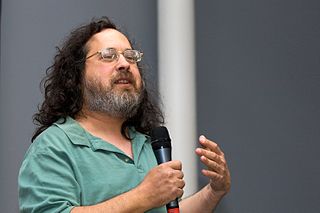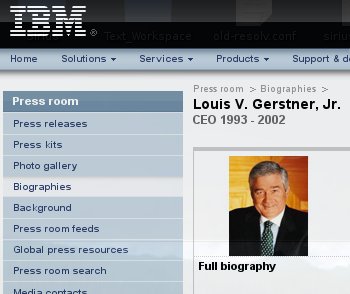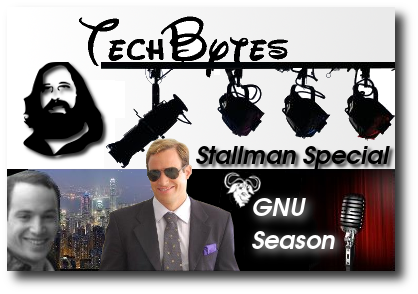11.21.13
Posted in FSF at 2:09 pm by Dr. Roy Schestowitz

By NicoBZH from Saint Etienne
Summary: Richard Stallman writes a letter to Judge Preska, whose prosecution against (and demonisation of) Jeremy Hammond shows a common misunderstanding/misconception
ON A COUPLE of occasions last week (and on other occasions quite recently) we wrote about the Hammond trial [1, 2], which oddly enough had appointed as its judge the spouse of a Stratfor client. Here’s Richard Stallman’s letter, which was quoted by a news site [1] the other day:
Dear Judge Preska
I’ve been proud to call myself a hacker since 1971. That’s when I was
hired by the MIT Artificial Intelligence Lab to join the team that
developed the lab’s operating systems — for which the unofficial job
title was “system hacker”. My subsequent hacking career has included
developing the GNU operating system, which is often erroneously called
“Linux”, and the legal hack of “copyleft” which uses copyright law to
ensure that all users of a program are free to redistribute it and
change it. I’ve received numerous awards and doctorates for my
hacking, and have been invited twice to publish articles in law
reviews.
Being a hacker means practicing and enjoying playful cleverness. (See
stallman.org/articles/on-hacking.html.) It does not particularly have
to do with breaking security. Indeed, no one ever broke security on
the AI lab’s system, because we decided not to implement any.
That decision, made by the original team members who became my
mentors, was not taken lightly: it was the result of careful political
and philosophical thought. Instead of keeping most users (those
without “privileges” — which already sounds like a prison) shackled
so that they could not hurt each other, we thought the lab members and
guest users could learn to get along as a community, choosing not to
hurt each other. And they did!
This example is not unusual for hackers. From the beginning, hackers’
taste for playful cleverness has often gone along with a sense of
social responsibility, concern for others’ well-being. Jeremy Hammond
is a fine example of a socially responsible hacker. He found a clever
way to expose the many nefarious deeds that Stratfor was planning and
proposing.
People should not be allowed to enter others’ computers without
permission; but when punishing someone for virtual trespassing, we
ought to consider his motive. Those who trespass as part of a
nonviolent protest, either physically or virtually, should not receive
severe punishments. Those who act neither for gain nor for malice
should not receive severe punishments. Imagine where our country
would be if the civil rights and antiwar sit-ins had been punished by
years in prison! If we do not want the US to be like Putin’s Russia,
imposing long sentences on protesters, we must steer clear of doing
so. That applies to virtual protests as well as physical ones.
I therefore respectfully suggest that Hammond be sentenced to
community service. To make use of his skills and abilities, this
service could consist of helping nonprofit organizations protect their
personal data.
Sincerely,
Richard Stallman
Lead developer of the GNU system (gnu.org)
President, Free Software Foundation (fsf.org)
MacArthur Fellow
Internet hall-of-famer (internethalloffame.org)
Stallman helped create what many of us call “Linux” now. He also fought for civil rights in the digital age, including privacy (see this article from October [2]). Thanks to GNU, which he founded 30 years ago, we now have Octave [3] (which I used a lot for work) and GCC (which a lot of companies use all the time). The latter project is still a leading example of GNU’s huge impact (see news in [4,5]) and despite Java’s advantages [6] GCC is walking away from it [7], probably due to Oracle’s behaviour.
Without GCC, where would C and C++ be today? It is rather sad that the biggest innovators are being characterised as criminals in the corporate media, whereas the biggest criminals are being portrayed as saints, heroes, and sometimes innovators too. █
Related/contextual items from the news:
-
Foundation president Richard Stallman tried to get Stratfor hacker Jeremy Hammond’s judge to only hand down a community service sentence. Hammond, instead, received 10 years in jail today.
Stallman provided VentureBeat with his letter in full, which you can find below.
-
As Richard Stallman’s GNU Project turns 30, the Free Software Foundation aims for a cloud that foils state-sponsored snooping
-
Finding the best way to process your data can be complicated. I recently became involved in a project where I needed to filter out data from an RF signal. Because I am not an RF designer with years of experience, I actually had to do a bit of reinventing the wheel. With a recording of data in hand, one option was to try and feed that data into a microcontroller, write up some test code, and then analyze the results. Another option was to use GNU Octave.
GNU Octave is a MATLAB-type environment that allows for numerical simulation. Information about the history of GNU Octave can be found here. MATLAB is an interpreted language that is coupled with the program by the same name. The main difference between MATLAB and GNU Octave is that MATLAB costs many thousands of dollars, whereas GNU Octave is an open-source program.
-
-
-
In benchmarks, Java-based frameworks enjoy a big performance lead
-
GCC developers from multiple companies are beginning to reach agreement that it’s time for Java to be turned off by default in GCC. The Java compiler support in GCC is in the form of GCJ, but it doesn’t see much active development these days with more of the Java work happening in OpenJDK. Developers are looking to disable Java from the default GCC build process but to potentially replace it with the Go or ADA languages.
Permalink
 Send this to a friend
Send this to a friend
Posted in Microsoft, Patents at 1:44 pm by Dr. Roy Schestowitz
Ghost of Microsoft, they know where it came from…

Summary: Microsoft, which is the source of many patent trolls in the world of software, is trying to present itself as “against trolls”
TECHRIGHTS has written a lot about Acacia since 2007 (the Wikipedia page looks like a PR masterpiece). 2007 was the year Acacia, a patent troll, launched an attack on Linux. 6 years later Microsoft sues Acacia and just as a reminder of news we covered before: “In 2010, Microsoft agreed to pay an Acacia subsidiary to license a portfolio of patents related to smartphones and tablets ultimately owned by Tokyo-based web browser firm Access Co.”
According to this Microsoft booster (altering the above report from Reuters), “Microsoft sued Acacia Research Corp. today, accusing the company of breaking a contract “to license various smartphone and mobile computing technologies to Microsoft,” Reuters reported.
“The suit was filed in US District Court in New York, but it’s currently under seal, which means that details are thin. The Microsoft accusations come in response to recent suits Acacia subsidiaries filed against Microsoft that allege infringement of more than a dozen patents. Acacia filed these lawsuits despite the fact that “in 2010, Microsoft agreed to pay an Acacia subsidiary to license a portfolio of patents related to smartphones and tablets ultimately owned by Tokyo-based Web browser firm Access Co.,” Reuters wrote.”
‘”Acacia’s lawsuits are the worst kind of abusive litigation behavior, attempting to extract payment based on litigation tactics and not the value of its patents,” Microsoft Deputy General Counsel David Howard told Reuters.”
This claim does not hold water. Acacia has been rather helpful to Microsoft for years and it also absorbed senior staff from Microsoft.
In other news from the same source, Newegg is still going after patent trolls. To quote the writer (who is definitely not a Microsoft booster): “After a five years of legal battles over Jones’ patent, involving hundreds of lawsuits and tens of millions of dollars in payments, that question still has no clear answer.
“Whatever the invention, hundreds of companies have paid tribute to it. Jones’ patent, now wielded through a holding company called TQP Development, has become one of the most widely asserted patents in history. In complaints, TQP lawyers have accused website after website of patent infringement for using one of the most common Web-encryption strategies: combining the Secure Sockets Layer (SSL) protocol with the RC4 encryption algorithm.”
Newegg has been very serious when it comes to fighting patent trolls, whereas Microsoft has been openly feeding patent trolls and using them as a weapon against competitors like Android. We must not let Microsoft portray itself as “against trolls”; Microsoft itself it the troll and it’s the source of the world’s biggest patent troll. Heck, its co-founder is a patent troll, too. The other Microsoft co-founder uses patents for huge profits at taxpayers’ expense. █
Permalink
 Send this to a friend
Send this to a friend
Posted in IBM, Microsoft, Patents at 1:15 pm by Dr. Roy Schestowitz

Summary: Microsoft is AstroTurfing and IBM has learned no lessons from mistakes like going along with Microsoft
THE OTHER day we showed that a longtime Microsoft AstroTurfing group, ACT, had morphed again and lobbied for software patents under the pretence that it represented small businesses and developers (to whom software patents are really horrific).
Well, two of the biggest software patentors, IBM and Microsoft, are still at it. As TechDirt put it, “Microsoft’s Intense Lobbying Works: Goodlatte To Drop Plan To Allow For Faster Review Of Bad Software Patents” (software patents).
To quote: “Last week, we wrote about Microsoft’s intense, and somewhat dishonest, lobbying to try to remove one aspect of proposed patent reform: the covered business methods program, which would have allowed approved technology patents to get reviewed by the Patent Office much more quickly. It was based on Senator Chuck Schumer’s plan, which enabled the same feature for patents related to financial services. Many have seen that Schumer’s effort was somewhat successful in stopping bad financial services patents, and so it makes sense to do the same thing for software as well. In fact, it makes more sense, since so many patent lawsuits and patent troll shakedowns involve software-related patents.”
AstroTurfing gets called PR now: “Oh, and to the PR guy from Microsoft who sent me a laughable email trying to argue that Microsoft is supportive of patent reform and that my post was unfair because I didn’t mention that: next time stay on topic. Yes, Microsoft supports some forms of patent reform. Just the kind that stops trolls from hitting it directly. What it doesn’t support is the kind of patent reform that would stop Microsoft’s all too common practice of shaking down all sorts of innovators and entrepreneurs with crazy patent licensing demands from its bundle of patents. No, Microsoft isn’t a patent troll, but it is a patent bully with a lot of bad patents, which apparently it’s scared that real innovators might invalidate a lot of those patents under a covered business method review.”
Here is more on what happened [via] and a reminder that they are “pretending that the problem is “bad” patents rather than software patents in and of themselves,” as iophk put it.
“On Wednesday,” says the article, “the House Judiciary Committee is scheduled to consider legislation aimed at reining in abusive patent litigation. But one of the bill’s most important provisions, designed to make it easier to nix low-quality software patents, will be left on the cutting room floor. That provision was the victim of an aggressive lobbying campaign by patent-rich software companies such as IBM and Microsoft.”
It’s just like what happened in NZ. Those two proprietary software giants and software patents hoarders just can’t help harming society. They do this quietly or by proxy to reduce public backlash. █
Permalink
 Send this to a friend
Send this to a friend
Posted in News Roundup at 6:13 am by Dr. Roy Schestowitz
-
OneNote is a proprietary computer software package for free-form information gathering and multi-user collaboration. It enables a user to capture what is important in their personal and professional life, captured by making notes, to-do lists, photos, audio clips, or videos. Information is stored in a non-linear form. OneNote is developed by the behemoth, Microsoft. Whilst the program is available for Android, it has not been ported to Linux.
-
Aqua Connect, Inc., the worldwide leader in Mac Remote Desktop Services, announced today a new product offering in their line of Mac OS X remote access solutions. The Aqua Connect Load Balancer for Linux was designed to improve on the current functionality of the Mac version while providing a more cost efficient platform for load balancing.
-
Viber Desktop is now also available on Linux, in addition to Windows and Mac platforms.
-
-
-
-
-
I decided I could take at least some action toward stemming the theft and perhaps catching the perpetrator, by setting up a security camera. I knew that GNU/Linux had utilities for recording from motion detection cameras, and some preliminary searching revealed that the motion program was likely to suit my needs.
It so happened that a friend had recently passed along to me a decent webcam, so all I needed to do was find a target machine on which to set up the software. An old laptop would have been ideal because of the small size, but I didn’t have one available.
What I did have was an old all-in-one unit, an early LCD monitor with a built-in computer–in the person of a laptop motherboard–in its base. I even had Debian (Squeeze) already installed on that machine, since I’d set it up for my father-in-law to use when he visits. But I’d taken the machine out of service a couple of years ago, judging that, as a single-core machine with a 433 MHz Celeron and 192 megabytes of RAM, it was getting a little long in the tooth to be useful anymore. So, could this ancient machine actually be used for a motion detection security camera?
-
-
You flashed an SD card with Raspberry Pi image, and plug the SD card into Raspberry Pi. Then what next? The first thing to do after booting Raspberry Pi is to configure your Raspberry Pi. Each Raspberry Pi system comes with its own software configuration tool. For example, use raspi-config for Raspbian, firstboot for Pidora, etc.
-
-
Nagios® Core™ is an Open Source system and network monitoring application. It watches hosts and services that you specify, alerting you when things go bad and when they get better.Nagios Core was originally designed to run under Linux, although it should work under most other unices as well.
-
-
-
-
-
-
-
-
-
-
-
MariaDB is the community developed fork of Mysql and is a great alternative to it. Its free and open source and is developed by the original developers of mysql. MariaDB is much superior to mysql in terms of features. Check out the comparison between mariadb and mysql.
-
Permalink
 Send this to a friend
Send this to a friend
11.20.13
Posted in TechBytes Video at 5:38 am by Dr. Roy Schestowitz

Direct download as Ogg (00:01:11, 3.8 MB)
Summary: Dr. Richard Stallman, the Free Software Foundation’s founder, offers his analysis of the Unitary Patent and what it means for software patents in Europe now that the EPO increases its influence over continental law
Made entirely using Free/libre software, heavily compressed for performance on the Web at quality’s expense
Permalink
 Send this to a friend
Send this to a friend
11.19.13
Posted in Site News at 1:47 pm by Dr. Roy Schestowitz

Summary: The scarcity of independent coverage of Free/Open Source software (FOSS) and GNU/Linux and what it all means
2013 was an exceptionally bad year for news sites which focus on FOSS. The H ceased publication, Groklaw did too (this time for good), Tux Machines relinquished control due to lack of time (my wife and I keep it going now), and some blogs that focused on Linux and GNU no longer do. In addition, audiocasts which used to regularly cover FOSS no longer do (or rarely do).
“Real journalism tries to appeal to readers, not advertisers and sponsors.”For one who pursues news items and good reporting in this area, the sources became meager and some are repetitive/unoriginal. In order to keep the message out there and in order to prevent FOSS from being abducted by large corporations that sell proprietary software we really need to consider our options. If there is no light shed on the success stories of FOSS and actions of enemies of FOSS (those who seek to destroy it) we will definitely lose momentum. Sure, Linux and FOSS are everywhere, but without the community’s scrutiny companies like IBM and Google silently close down some parts (e.g. in Android) or turn them hostile (TPM, UEFI restricted boot, DRM and so on).
Free-as-in-freedom software is 30 years old, but the second half of its life (about 15 years) characterised corporate transformation under the “open source” wing or brand. Right now, even a hugely corrupt proprietary software giant like Microsoft affiliates itself with this movement. This is wrong.
Real journalism tries to appeal to readers, not advertisers and sponsors. The latter should be an afterthought and hardly a consideration at all. “Linux Voice” will be fresh breath of air because no more will its talented writers be pressured (implicitly) to write corporate sponsors-friendly articles (I have seen it from the inside); the sponsors are people who read the work and this is how it should be done. This is how independent news channels like “Democracy Now” work. It is the only way to guarantee that software patents get bashed (large corporations like IBM love them) and companies like Novell get treated very harshly for colluding with Microsoft to extort FOSS using patent lawsuit threats. The community’s voice has been an essential regulator and proactive enforcer of ethics.
“Those who honestly believe that profit-driven stewardship on its own will take us in a better direction should learn the history of Hippies and their movement.”In 2014 we won’t have many independent sites left. Those that remain deserve to get support from their readers. Ruling out a sellout, their only other option is to shut down, potentially paying for hosting to keep old stories accessible free of charge (some old newspapers turn to paywalls). Once we lose our collective voice as a community, it will all be left for corporate vultures to devour (companies like Cisco and Microsoft, which go out of their way to help the NSA).
There is an important point worth reiterating (we already made it earlier this month). Don’t count on the Linux Foundation to represent the community. It is all about corporations, which make up almost all of its budget. Recently, Juniper joined the circles of the Linux Foundation. Juniper is a company heavily occupied by many Microsoft executives who moved there. Former Microsoft staff inside those circles is now in management, too, not just membership.
Those who honestly believe that profit-driven stewardship on its own will take us in a better direction should learn the history of Hippies and their movement. The direction taken when corporations alone dominate a movement is surely good… for corporations. It gives them more power at people’s expense. They extinguish grassroots and leave activists a little sandbox to play in, mostly as a marketing exercise. In recent years it has felt like this is where the Open Source folks are taking us, unlike the FSF. █
Permalink
 Send this to a friend
Send this to a friend
Posted in America, Australia, Free/Libre Software at 6:17 am by Dr. Roy Schestowitz

Summary: Free/Open Source software (FOSS) is increasingly being adopted by those whose budget comes from the public (through the state)
Federal agencies are said to be embracing more and more FOSS [1] and Australia follows a similar trajectory [2], realising that savings and quality through sharing and collaboration serve the public better. In education, which is also funded by taxpayers (and thus should serve the public), FOSS has new gains [3] and in healthcare too we see major signs of progress [4-6]. What makes the public sector so unique is that by definition it must serve the public interest, which typically means creating jobs for domestic developers, reducing spendings on unnecessary software, and giving back all the code to the public which paid for it. Every branch of the public sector should make FOSS obligatory, not just a recommended item. █
Related/contextual items from the news:
-
Federal agencies, looking for new ways to lower their IT costs, are exploiting open-source software tools in a wider range of applications, not only to reduce software costs, but also to tighten network security, streamline operations, and reduce expenses in vetting applications and services.
-
The South Australian Government is considering running a trial of the Joinup platform, hoping to use it as their internal sharing and collaboration platform, a spokesperson for the CIO confirmed today. According to Stephen Schmid, general manager of the Open Technology Foundation, the South Australian is also working towards federating the internal platform with Openray, a similar platform open to the public sector in Australia and New Zealand.
-
Littlebits is disrupting the open hardware space. It’s “an open source library of electronic modules that snap together with magnets for prototyping, learning, and fun.” The company is the invention of Ayah Bdeir, an MIT graduate and TED senior fellow, and was founded in September 2011.
-
-
-
The U.S. Department of Veterans Affairs (VA) and the open source IT community have paired up to prove the benefits of fixing technical security flaws within an open source system. According to the Open Source Electronic Health Record Agent (OSEHRA) corporation, Georgia Tech graduate student Doug Mackey evaluated the Veterans Health Information Systems and Technology Architecture (VistA) EHR for a term project on computer security and found a substantial security vulnerability.
Permalink
 Send this to a friend
Send this to a friend
Posted in News Roundup at 5:56 am by Dr. Roy Schestowitz
-
For most tech professionals, the words “open source operating system” naturally translate to Linux. And so it’s understandable that those same tech pros would be a bit confused by startup Cloudius Systems’ announcement in September of a new open source operating system for the cloud, OSv.
-
-
-
Records obtained by DBA Press and the Center for Media and Democracy (DBA/CMD) shed new light on a technology, OpenMIND, utilized by law enforcement/counter-terrorism fusion center personnel in gathering and analyzing mass amounts of “open source intelligence” derived from the online lives of Americans.
-
-
Andy’s first point began with an astute observation. Open source software is often discussed in terms of being a “stack” (LAMP, for instance). It is no longer a stack, however, but a tower. A tower that spans software and hardware. With the source or schematics being available, not only can we stand on the shoulders of the giants of our field but on the shoulders of everyone who contributes. It’s an embarrassment of riches.
-
From simple bookkeeping packages to full-blown ERP systems, open source software can provide free options for small businesses that don’t have the budget for big-ticket enterprise applications.
-
-
In August, the Fedora Project held its first Flock conference, a replacement for the North American and European FUDCon (Fedora Users and Developers Conference) events. Flock was a four-day, planned conference with talks, workshops, and hackfests, in contrast to FUDCon’s barcamp model. In the interest of reaching beyond the community and reminding everyone that Fedora is so much broader than just a Linux project, the invited keynote speakers were from open source areas outside of the Fedora Project. One of those keynotes was by Dave Crossland, creator of the open font Cantarell and an active part of the free font movement.
-
The hobbies that inspired the scientific curiosity of my generation were Erector Sets, Science Fair Electronic Kits from Radio Shack and model rockets with balsa wood fins that we meticulously assembled and painted. While these toys piqued our curiosity in science and engineering our ability to share our discoveries were limited by geography. These fascinating distractions were often purpose-built and confined our creativity within their intended purpose.
-
This story is definitely a first for me. Not just because every story is unique in itself, but that it’s one of personal matter. The thing is, I quit my well-paid job, just to spend time on the things I’m very passionate about: open source development and information security. Not only was quitting my job a serious step, also the decision to share my personal story after 10+ years of working with open source software and security. Well, here you go. It’s my hope to intrigue others, find their passion in life and also go for it!
-
Who wants to tackle the complex problem of helping educators create learning service agreements? I don’t see too many hands. How about you there, reading this article? Wait, you weren’t aware that this is an issue that impacts the education system? Well, here’s an open source project that solves this problem and needs more collaborators.
-
-
-
-
For most of us, Google shutting down Reader was annoying. For Jacob Cook, it was a call to arms.
He’s now building an operating system that anyone can use to replace all of the services that Google provides — or any other cloud company, for that matter. Email, chat, file sharing, web hosting: With Cook’s arkOS, you’ll be able to run all of those essential services on a secure, private server in your own home that’s about the size of a credit card.
-
Facebook’s HipHop Virtual Machine (HHVM) open-source project that’s been seeking to implement a high-performance PHP, is in the middle of a lock-down and for three weeks they are focusing on nothing bot boosting the performance of their PHP implementation and seeking to hit feature parity.
-
There was nothing new in what Matt Dugan said. There were no ground breaking revelations. He just methodically made his case, point by point, explaining why open source was usually, if not always, the best solution for business.
To me, this was just what the doctor ordered. I’d just sat through a forty-five minute lecture in that very same room from an open core guy that had left me fearing that enterprise open source companies were just as greedy and potentially as unethical as the proprietary guys. Dugan fixed that and quickly reaffirmed my faith in the notion that open source is where the good guys live.
-
Mahout components implement popular algorithms and can be unplugged easily when no longer needed.
-
MediaCore CE is the community edition of MediaCore, a Web application that powers a multimedia hosted platform targeted towards the educational market and run by MediaCore, Inc. It is a Python application built atop the Django Web framework.
Published under the GNU General Public License version 3, MediaDrop is free to download and use. However, because it is a Django application, installing it is a little bit more involved than the point-and-click process commonly associated with PHP applications.
-
Wireless connectivity between devices and display monitors remains mostly fantasy today, Google’s Chromecast notwithstanding. But it could become a big deal for tablets, smartphones and even traditional PCs in the future. And it may even work on Linux, if the nascent OpenWFD project succeeds—which would be very good news for open source hardware vendors.
-
The Gate One HTML5-powered terminal emulator and SSH client that goes without needing any browser plug-ins and supports many SSH/terminal features is working on bringing X11 support to the web-browser. The developer claims that this X11 support in the browser written in HTML5 will be fast enough to support video playback and he’s made a video demo as proof.
-
Linux and MySQL are old news. Partners must now open their minds to NoSQL, Hadoop, KVM, OpenStack and OpenDaylight
Permalink
 Send this to a friend
Send this to a friend
« Previous Page — « Previous entries « Previous Page · Next Page » Next entries » — Next Page »
Further Recent Posts
- Links 5/1/2017: Inkscape 0.92, GNU Sed 4.3
Links for the day
- Links 4/1/2017: Cutelyst 1.2.0 and Lumina 1.2 Desktop Released
Links for the day
- Financial Giants Will Attempt to Dominate or Control Bitcoin, Blockchain and Other Disruptive Free Software Using Software Patents
Free/Open Source software in the currency and trading world promised to emancipate us from the yoke of banking conglomerates, but a gold rush for software patents threatens to jeopardise any meaningful change or progress
- New Article From Heise Explains Erosion of Patent Quality at the European Patent Office (EPO)
To nobody's surprise, the past half a decade saw accelerating demise in quality of European Patents (EPs) and it is the fault of Battistelli's notorious policies
- Insensitivity at the EPO’s Management – Part V: Suspension of Salary and Unfair Trials
One of the lesser-publicised cases of EPO witch-hunting, wherein a member of staff is denied a salary "without any notification"
- Links 3/1/2017: Microsoft Imposing TPM2 on Linux, ASUS Bringing Out Android Phones
Links for the day
- Links 2/1/2017: Neptune 4.5.3 Release, Netrunner Desktop 17.01 Released
Links for the day
- Teaser: Corruption Indictments Brought Against Vice-President of the European Patent Office (EPO)
New trouble for Željko Topić in Strasbourg, making it yet another EPO Vice-President who is on shaky grounds and paving the way to managerial collapse/avalanche at the EPO
- 365 Days Later, German Justice Minister Heiko Maas Remains Silent and Thus Complicit in EPO Abuses on German Soil
The utter lack of participation, involvement or even intervention by German authorities serve to confirm that the government of Germany is very much complicit in the EPO's abuses, by refusing to do anything to stop them
- Battistelli's Idea of 'Independent' 'External' 'Social' 'Study' is Something to BUY From Notorious Firm PwC
The sham which is the so-called 'social' 'study' as explained by the Central Staff Committee last year, well before the results came out
- Europe Should Listen to SMEs Regarding the UPC, as Battistelli, Team UPC and the Select Committee Lie About It
Another example of UPC promotion from within the EPO (a committee dedicated to UPC promotion), in spite of everything we know about opposition to the UPC from small businesses (not the imaginary ones which Team UPC claims to speak 'on behalf' of)
- Video: French State Secretary for Digital Economy Speaks Out Against Benoît Battistelli at Battistelli's PR Event
Uploaded by SUEPO earlier today was the above video, which shows how last year's party (actually 2015) was spoiled for Battistelli by the French State Secretary for Digital Economy, Axelle Lemaire, echoing the French government's concern about union busting etc. at the EPO (only to be rudely censored by Battistelli's 'media partner')
- When EPO Vice-President, Who Will Resign Soon, Made a Mockery of the EPO
Leaked letter from Willy Minnoye/management to the people who are supposed to oversee EPO management
- No Separation of Powers or Justice at the EPO: Reign of Terror by Battistelli Explained in Letter to the Administrative Council
In violation of international labour laws, Team Battistelli marches on and engages in a union-busting race against the clock, relying on immunity to keep this gravy train rolling before an inevitable crash
- FFPE-EPO is a Zombie (if Not Dead) Yellow Union Whose Only de Facto Purpose Has Been Attacking the EPO's Staff Union
A new year's reminder that the EPO has only one legitimate union, the Staff Union of the EPO (SUEPO), whereas FFPE-EPO serves virtually no purpose other than to attack SUEPO, more so after signing a deal with the devil (Battistelli)
- EPO Select Committee is Wrong About the Unitary Patent (UPC)
The UPC is neither desirable nor practical, especially now that the EPO lowers patent quality; but does the Select Committee understand that?
- Links 1/1/2017: KDE Plasma 5.9 Coming, PelicanHPC 4.1
Links for the day
- 2016: The Year EPO Staff Went on Strike, Possibly “Biggest Ever Strike in the History of the EPO.”
A look back at a key event inside the EPO, which marked somewhat of a breaking point for Team Battistelli
- Open EPO Letter Bemoans Battistelli's Antisocial Autocracy Disguised/Camouflaged Under the Misleading Term “Social Democracy”
Orwellian misuse of terms by the EPO, which keeps using the term "social democracy" whilst actually pushing further and further towards a totalitarian regime led by 'King' Battistelli
- EPO's Central Staff Committee Complains About Battistelli's Bodyguards Fetish and Corruption of the Media
Even the EPO's Central Staff Committee (not SUEPO) understands that Battistelli brings waste and disgrace to the Office
- Translation of French Texts About Battistelli and His Awful Perception of Omnipotence
The paradigm of totalitarian control, inability to admit mistakes and tendency to lie all the time is backfiring on the EPO rather than making it stronger
- 2016 in Review and Plans for 2017
A look back and a quick look at the road ahead, as 2016 comes to an end
- Links 31/12/2016: Firefox 52 Improves Privacy, Tizen Comes to Middle East
Links for the day
- Korea's Challenge of Abusive Patents, China's Race to the Bottom, and the United States' Gradual Improvement
An outline of recent stories about patents, where patent quality is key, reflecting upon the population's interests rather than the interests of few very powerful corporations
- German Justice Minister Heiko Maas, Who Flagrantly Ignores Serious EPO Abuses, Helps Battistelli's Agenda ('Reform') With the UPC
The role played by Heiko Maas in the UPC, which would harm businesses and people all across Europe, is becoming clearer and hence his motivation/desire to keep Team Battistelli in tact, in spite of endless abuses on German soil
- Links 30/12/2016: KDE for FreeBSD, Automotive Grade Linux UCB 3.0
Links for the day
- Software Patents Continue to Collapse, But IBM, Watchtroll and David Kappos Continue to Deny and Antagonise It
The latest facts and figures about software patents, compared to the spinmeisters' creed which they profit from (because they are in the litigation business)
- 2016 Was a Terrible Year for Patent Trolls and 2017 Will Probably be a Lot Worse for Them
The US Supreme Court (SCOTUS) is planning to weigh in on a case which will quite likely drive patent trolls out of the Eastern District of Texas, where all the courts that are notoriously friendly towards them reside
- Fitbit’s Decision to Drop Patent Case Against Jawbone Shows Decreased Potency of Abstract Patents, Not Jawbone’s Weakness
The scope of patents in the United States is rapidly tightening (meaning, fewer patents are deemed acceptable by the courts) and Fitbit’s patent case is the latest case to bite the dust
- The EPO Under Benoît Battistelli Makes the Mafia Look Like Rookies
Pretending there is a violent, physical threat that is imminent, Paranoid in Chief Benoît Battistelli is alleged to have pursued weapons on EPO premises























 Content is available under CC-BY-SA
Content is available under CC-BY-SA